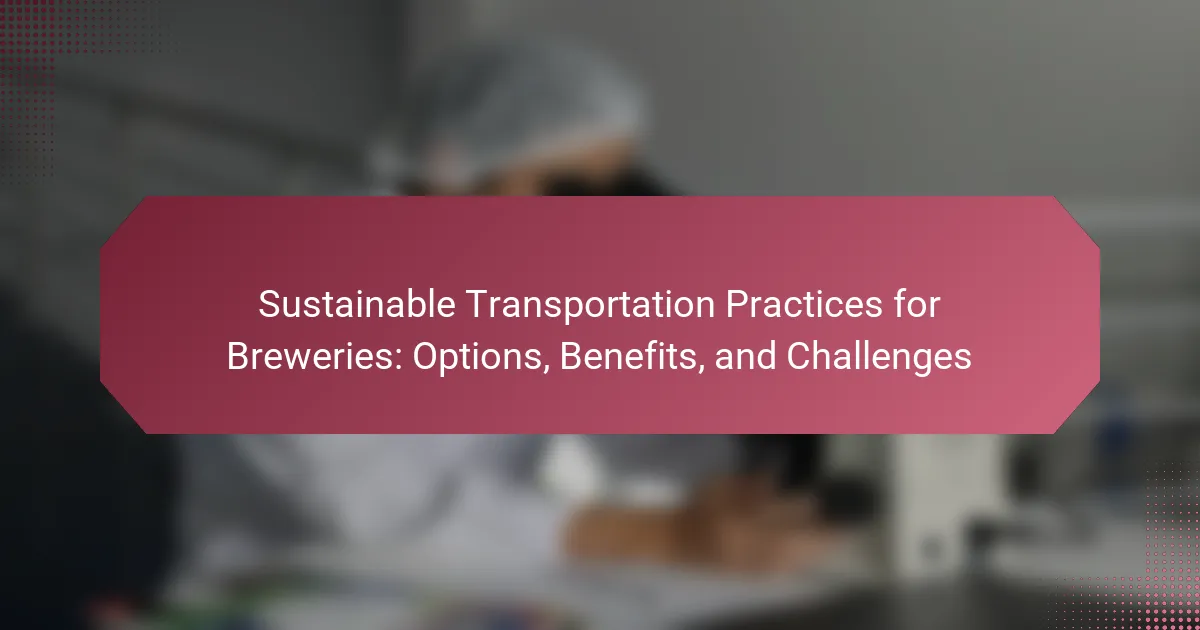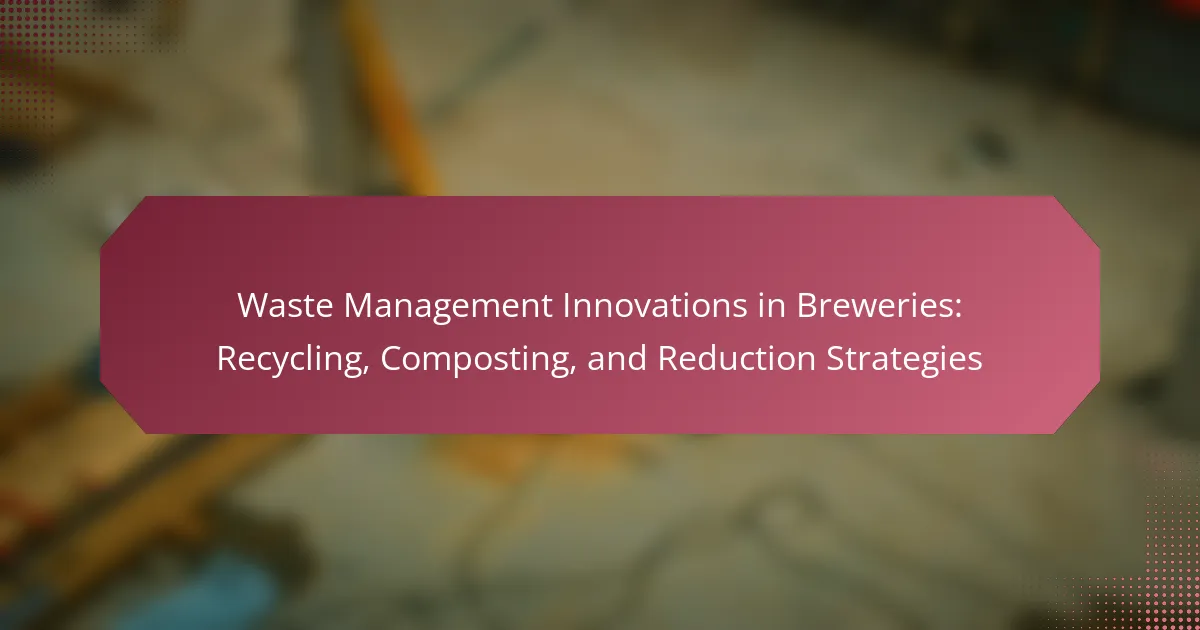Sustainable transportation practices for breweries focus on reducing environmental impact while enhancing operational efficiency. Key strategies include the use of energy-efficient vehicles, such as electric or hybrid models, and optimizing delivery routes through logistics management systems. Collaborating with local suppliers minimizes transportation distances, further lowering carbon emissions. Additionally, breweries can share transportation resources to decrease costs and emissions collectively. These practices not only contribute to sustainability goals but also result in potential cost savings for breweries.

What are Sustainable Transportation Practices for Breweries?
Sustainable transportation practices for breweries include using energy-efficient vehicles and optimizing delivery routes. Breweries can implement electric or hybrid vehicles to reduce carbon emissions. Utilizing local suppliers minimizes transportation distances, which lowers overall environmental impact. Implementing a logistics management system enhances route efficiency, reducing fuel consumption. Collaborating with other breweries for shared transportation can further decrease costs and emissions. These practices not only support environmental goals but also improve operational efficiency and can lead to cost savings.
Why are Sustainable Transportation Practices important for Breweries?
Sustainable transportation practices are important for breweries because they reduce environmental impact and enhance operational efficiency. Breweries often rely on transportation for raw materials and distribution of finished products. Implementing sustainable practices can lower carbon emissions associated with these activities. For example, using electric vehicles or optimizing delivery routes can significantly reduce fuel consumption. Additionally, sustainable practices can improve a brewery’s brand image and appeal to environmentally conscious consumers. Studies show that businesses adopting sustainable practices often experience increased customer loyalty and market share. By prioritizing sustainability, breweries can also potentially reduce costs over time through energy savings and improved logistics.
How do these practices impact environmental sustainability?
Sustainable transportation practices for breweries positively impact environmental sustainability by reducing carbon emissions. These practices often involve using energy-efficient vehicles and optimizing delivery routes. For instance, breweries that implement electric delivery trucks can significantly lower their greenhouse gas emissions. Research indicates that electric vehicles can reduce emissions by up to 70% compared to traditional diesel trucks. Additionally, utilizing local sourcing minimizes transportation distances, further decreasing the carbon footprint. Implementing these practices not only benefits the environment but also enhances the brewery’s reputation among eco-conscious consumers.
What role do these practices play in brewery operations?
Sustainable transportation practices play a crucial role in brewery operations by reducing carbon emissions and operational costs. These practices include using energy-efficient vehicles and optimizing delivery routes. Implementing such strategies can lead to a significant decrease in fuel consumption. For instance, breweries that adopt electric or hybrid vehicles can lower their greenhouse gas emissions by up to 50%. Additionally, efficient logistics can enhance supply chain management, ensuring timely deliveries. This not only improves customer satisfaction but also minimizes waste. Furthermore, sustainable transportation can enhance a brewery’s brand image, appealing to environmentally conscious consumers. Overall, these practices contribute to operational efficiency and sustainability in the brewing industry.
What options are available for Sustainable Transportation in Breweries?
Breweries can utilize several options for sustainable transportation. Electric vehicles (EVs) are increasingly adopted for delivery and logistics. These vehicles reduce carbon emissions compared to traditional fuel-powered options. Bicycle couriers are another sustainable choice for local deliveries. They minimize environmental impact and promote health. Rail transport can be employed for shipping large quantities of raw materials. This method is more energy-efficient than road transport. Additionally, breweries can implement route optimization software. This technology reduces fuel consumption and improves delivery efficiency. Using biofuels for transportation vehicles is also an option. Biofuels can be derived from waste products, further enhancing sustainability.
What types of vehicles can breweries use for sustainable transportation?
Breweries can use electric vans for sustainable transportation. Electric vans reduce carbon emissions significantly compared to traditional gasoline vehicles. They are powered by rechargeable batteries, making them environmentally friendly. Another option is biodiesel trucks, which utilize renewable resources. These trucks can lower greenhouse gas emissions when sourced from waste oils. Additionally, bicycles can be employed for local deliveries. Cargo bikes are efficient for short distances and promote zero emissions. Using public transportation for employee commuting also supports sustainability. Each of these vehicle types contributes to reducing the brewery’s overall environmental footprint.
How can breweries optimize their supply chain for sustainability?
Breweries can optimize their supply chain for sustainability by implementing eco-friendly practices. They can reduce energy consumption through efficient brewing processes. Utilizing renewable energy sources, such as solar or wind, can significantly lower carbon footprints. Breweries should also focus on sourcing local ingredients to minimize transportation emissions.
Implementing a circular economy model can further enhance sustainability. This involves reusing waste products, like spent grains, for animal feed or composting. Breweries can optimize logistics by using data analytics to streamline delivery routes. This reduces fuel consumption and enhances overall efficiency.
Investing in sustainable packaging materials is another crucial strategy. Using recyclable or biodegradable materials can lessen environmental impact. According to a study by the Brewers Association, sustainable practices can lead to cost savings and improved brand loyalty. These strategies collectively contribute to a more sustainable supply chain in the brewing industry.
What are the benefits of implementing Sustainable Transportation Practices in Breweries?
Implementing sustainable transportation practices in breweries reduces carbon emissions. This contributes to environmental preservation. Breweries can lower operational costs through fuel-efficient transportation methods. Sustainable practices enhance brand reputation among eco-conscious consumers. They also promote regulatory compliance with environmental standards. Improved logistics efficiency leads to better supply chain management. Sustainable transportation can result in reduced waste through optimized routes. Overall, these benefits foster long-term sustainability and profitability for breweries.
How do these practices affect cost savings for breweries?
Sustainable transportation practices significantly reduce operational costs for breweries. These practices lower fuel consumption through optimized routing and vehicle efficiency. For instance, using energy-efficient vehicles can decrease fuel expenses by up to 30%. Additionally, implementing local sourcing minimizes transportation distances, further cutting costs. Streamlined logistics can also reduce delivery times, leading to increased productivity. According to a study by the National Renewable Energy Laboratory, adopting sustainable practices can save businesses an average of 10-20% in transportation costs. Overall, these strategies enhance financial performance while promoting environmental responsibility.
What positive impacts do they have on community relations?
Sustainable transportation practices for breweries enhance community relations by fostering local engagement. These practices often involve using eco-friendly vehicles, which reduces carbon emissions. Lower emissions contribute to improved air quality in the community. Additionally, breweries that adopt sustainable practices often collaborate with local suppliers. This supports the local economy and strengthens community ties. Community events centered around sustainability initiatives can also increase local participation. For instance, breweries may host clean-up events or educational workshops. Such activities build a positive reputation and trust within the community. Overall, these practices create a sense of shared responsibility and commitment to local well-being.
What challenges do Breweries face when adopting Sustainable Transportation Practices?
Breweries face several challenges when adopting sustainable transportation practices. High initial costs for eco-friendly vehicles can deter investment. Limited availability of sustainable transport options may restrict choices. Additionally, existing infrastructure may not support efficient sustainable practices. Breweries often encounter logistical complexities in integrating new systems. Regulatory compliance can also complicate the transition to sustainable methods. Market demand for rapid delivery may conflict with sustainable practices. Lastly, staff training on new systems can require significant time and resources. These challenges can hinder the effective implementation of sustainable transportation in the brewing industry.
What are the common barriers to implementation?
Common barriers to implementation of sustainable transportation practices for breweries include high initial costs, lack of infrastructure, and resistance to change. High initial costs can deter breweries from investing in new technologies or vehicles. Lack of infrastructure, such as charging stations for electric vehicles, limits operational feasibility. Resistance to change often stems from established practices and fear of disruption. Additionally, regulatory challenges may complicate the adoption of sustainable practices. Research indicates that these barriers can significantly slow down progress in sustainability efforts within the brewing industry.
How can breweries overcome these challenges?
Breweries can overcome challenges in sustainable transportation by adopting eco-friendly logistics solutions. Implementing route optimization software can reduce fuel consumption and emissions. Utilizing electric or hybrid vehicles can further decrease carbon footprints. Collaborating with local suppliers minimizes transportation distances and supports community economies. Investing in renewable energy sources for operations enhances sustainability. Implementing packaging innovations can reduce waste during transportation. Training staff on sustainability practices fosters a culture of environmental responsibility. These strategies collectively contribute to more sustainable transportation practices in breweries.
How can breweries measure the effectiveness of their Sustainable Transportation Practices?
Breweries can measure the effectiveness of their Sustainable Transportation Practices through several key metrics. They can track fuel consumption to assess reductions in energy use. Monitoring greenhouse gas emissions provides insight into environmental impact. Delivery efficiency can be evaluated by analyzing route optimization and load capacity. Customer feedback can indicate satisfaction with delivery practices. Cost savings from reduced fuel and maintenance expenses also reflect effectiveness. Additionally, comparing transportation metrics before and after implementing sustainable practices offers clear data on improvements. These measures collectively provide a comprehensive view of sustainability efforts in brewery transportation.
What metrics should breweries track for sustainability success?
Breweries should track metrics such as water usage, energy consumption, waste generation, and carbon emissions for sustainability success. Monitoring water usage helps breweries understand their efficiency and identify areas for reduction. Tracking energy consumption reveals the impact of operations on overall sustainability. Waste generation metrics indicate how much material is being diverted from landfills. Carbon emissions data provides insight into the brewery’s environmental footprint. According to the Brewers Association, breweries can reduce water usage to as little as 3.5 gallons per gallon of beer produced. Energy audits can identify savings opportunities, potentially reducing energy costs by 10-30%. Thus, these metrics are essential for breweries aiming for sustainable practices.
How can breweries adjust their practices based on performance data?
Breweries can adjust their practices based on performance data by analyzing metrics related to production efficiency, waste management, and energy use. This analysis allows breweries to identify areas for improvement. For instance, tracking energy consumption can reveal inefficiencies in brewing processes. By implementing energy-saving technologies, breweries can reduce costs and environmental impact. Additionally, performance data on transportation logistics can optimize delivery routes. This leads to reduced fuel consumption and lower carbon emissions. Regularly reviewing sales data helps breweries align production with consumer demand. This minimizes overproduction and waste. Overall, leveraging performance data enables breweries to enhance sustainability and operational efficiency.
What are some best practices for Breweries to enhance Sustainable Transportation?
Breweries can enhance sustainable transportation by adopting several best practices. Implementing a fleet of electric or hybrid delivery vehicles reduces carbon emissions. Utilizing local suppliers minimizes transportation distances, thus lowering the environmental impact. Collaborating with other local businesses for shared delivery routes can optimize logistics and decrease fuel consumption. Encouraging employees to use public transportation or carpooling reduces individual vehicle use. Offering incentives for customers who bike or walk to the brewery promotes eco-friendly visits. Finally, investing in infrastructure for bike parking and charging stations for electric vehicles supports sustainable transportation options. These practices collectively contribute to a more sustainable transportation model within the brewery industry.
How can breweries engage employees in sustainability initiatives?
Breweries can engage employees in sustainability initiatives by implementing training programs focused on environmental practices. These programs can educate staff about waste reduction, energy efficiency, and sustainable sourcing. Regular workshops can encourage participation and foster a culture of sustainability. Breweries can also create green teams to lead initiatives and gather employee input. Incentives such as recognition programs can motivate employees to adopt sustainable practices. Research shows that engaged employees are 17% more productive, which can enhance overall brewery performance. Additionally, breweries can involve employees in community sustainability projects, strengthening their commitment to environmental responsibility.
What partnerships can breweries form to improve transportation sustainability?
Breweries can form partnerships with local farmers to source ingredients sustainably. This reduces transportation distances for raw materials. Breweries can also collaborate with logistics companies focused on eco-friendly practices. These companies often utilize electric or hybrid vehicles, lowering carbon emissions. Additionally, breweries can partner with other local businesses for shared transportation resources. This can include co-loading shipments to minimize trips. Collaborating with municipal transportation services can also enhance sustainability. Local governments often have programs aimed at reducing emissions. Lastly, breweries may engage in partnerships with environmental organizations for guidance on best practices. These collaborations can lead to innovative solutions for sustainable transportation.
Sustainable Transportation Practices for Breweries focus on methods that reduce environmental impact while enhancing operational efficiency. Key practices include the use of energy-efficient vehicles, local sourcing, and route optimization to lower carbon emissions and fuel consumption. The article explores the importance of these practices, their benefits such as cost savings and improved brand reputation, and the challenges breweries face in implementation. Additionally, it discusses metrics for measuring effectiveness and best practices for engaging employees and forming partnerships to enhance sustainability in transportation.



